Winterizing your pond is a must if you live in a cold climate like I do. But don’t worry, it sounds much harder than it is, and you don’t have to remove hardy fish and plants.
In this post, I will show you exactly how to prepare your pond step by step. Plus I’ll give you tons of tips for overwintering your fish, plants, pumps, fountains, and waterfalls.
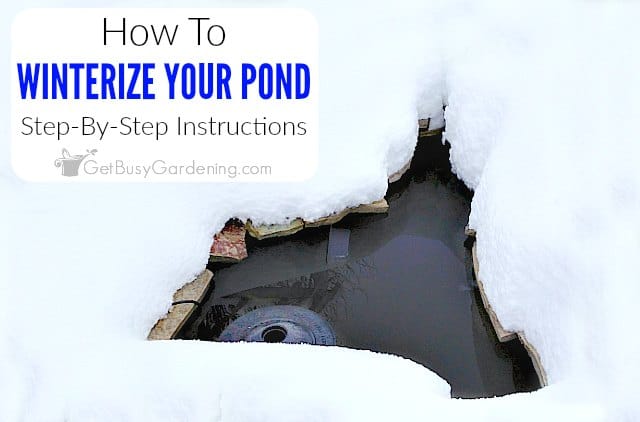
How To Winterize Your Pond: Step By Step
In this section, I will give you the steps I take for wintering my pond. The exact steps you take may be different, depending on whether you have fish, plants, a pump, waterfall, or fountain.
Supplies Needed
- Skimmer net
- Floating de-icer
- Netting (optional)
- Beneficial bacteria for cold water (optional)
Step By Step Instructions
Step 1: Clean out any debris – Decomposing organic material, like fallen leaves, releases toxic gasses that can build up in the water and kill your fish. So it’s important to remove as much as you can before it freezes.
To make it easier in the fall, you can try covering your pond with netting to help prevent leaves and other debris from falling in. Once the trees are bare, use a skimmer net to clean everything out of the water.
Related Post: How To Clean Your Fish Pond
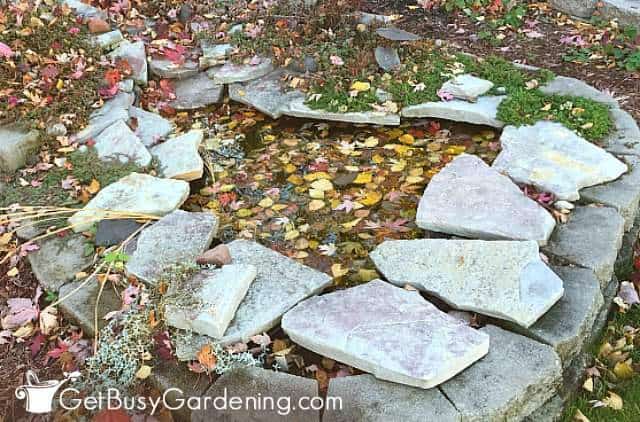
Step 2: Prune the plants – If you have any pond plants, pull them out of the water and cut them back to remove all the foliage down to the base. Just like with leaves, decomposing plant material can release toxic gasses.
Step 3: Add cold water bacteria (optional) – Cold water beneficial bacteria helps to break down the waste and debris faster. This keeps the water cleaner and clearer during the winter months, and reduces the chance of gasses building up in the water.
Step 4: Turn off the pump – The next step I take is to turn off the pump and clean the filter. It’s also a good idea to remove any parts that are sticking out above the surface, like waterfall tubing or fountain attachments. That way they won’t get damaged when the water freezes.
Step 5: Put the plants and pump back in – Once everything is clean and turned off, you can put the plants and pump back. Be sure to place them into the deepest part of your pond to protect them from freezing.
Step 6: Add a heater – If you’re overwintering fish in your pond, then it’s very important to keep a hole open in the ice so they don’t suffocate. So the last step that I take to winterize my pond is to put my floating de-icer on top.
How To Keep Your Pond From Freezing Over
If you live somewhere with mild winters, then you can just leave your pump running. The moving water will be enough to keep your pond from freezing over.
But if you’re in a colder climate like I am here in Minnesota, you will need some kind of a floating heater (also called a de-icer) to keep a hole open in the ice.
Sometimes during extreme cold spells, the water will freeze over even with the heater. That’s ok since it usually only lasts a few days before it opens up again.
If your pond does end up freezing over, do NOT try to open a hole in the ice by pounding on it, because that can kill your fish. I learned this lesson the hard way, I once killed three of my fish by pounding on the ice, I was so upset! So just lay the floating de-icer on top, and eventually it will melt through.
Tips For Winterizing Your Pond
In this section, I’ll give you detailed tips for winterizing your pond pump, fish, plants, and waterfalls or fountains.
When To Remove The Pond Pump
If the water isn’t going to freeze solid, then you don’t need to remove the pump from your pond during the winter. I leave mine sitting on the bottom in the deepest part (which is about 18″ for one and 2′ for the other).
However, if you don’t plan to use a heater, then I definitely recommend removing your pump and keeping it in the basement, garage, or a shed.
Otherwise, if your pond ends up freezing to the bottom, then it could cause severe damage, or even destroy your pump.
Related Post: Winterizing A Rain Barrel In 4 Easy Steps
Winterizing A Pond With Fish
If you plan to overwinter fish in your pond, then you must prevent the water from freezing over or they probably won’t survive.
Maintaining an open area will allow any toxic gasses to escape and oxygen to enter the water to keep the fish alive. It will also prevent the water from freezing to the bottom.
You should also avoid feeding your fish in the winter. They don’t digest food very well when it’s cold, and feeding them could end up killing them. It can also cause harmful gasses to build up in the water as the food decomposes. Don’t worry, they’ll be hibernating and won’t need food anyway.
Related Post: How To Keep Your Pond Water Clear
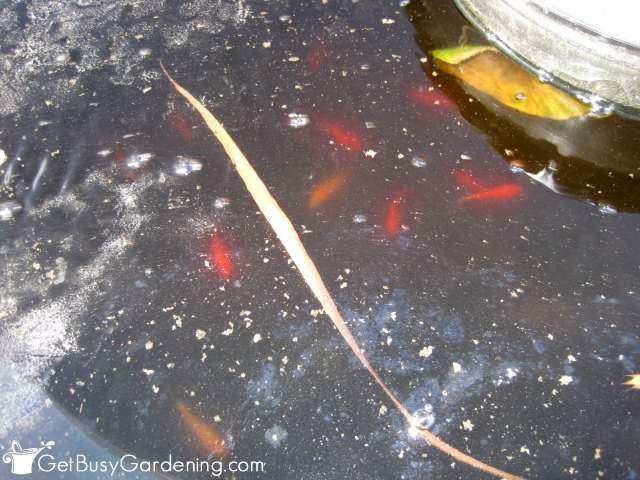
Keeping Pond Plants Alive Over Winter
Hardy plants, like water lilies and pussy willows, can survive just fine. So you don’t need to worry about removing them. Just cut them back and put them into the deepest part of the pond.
However tropicals, like canna lilies and elephant ears, won’t survive if it freezes. So you should remove and discard them, or overwinter those plants indoors.
Winterizing Pond Waterfalls & Fountains
If you live in a warm climate, you can leave your fountain and waterfall running all winter. However, if you have freezing temps at all, even if it’s just a one night cold snap, then I recommend turning off your water features.
If it freezes on top or the waterfall starts to solidify, it can divert the flow out of the pond and quickly drain it (another lesson I learned the hard way, UGH!).
In extremely cold areas, you should remove all of the parts that are at or near the surface, like fountain attachments and waterfall tubing, and store them inside.
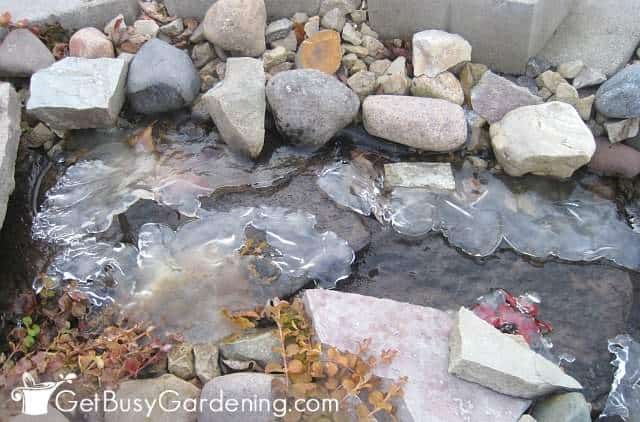
Leave The Snow Cover
If it snows during the winter where you live, don’t worry if your pond gets buried, it can actually be a good thing. Snow adds a layer of insulation over the heater to keep the hole open.
It also helps the water stay warmer than it would if there was no snow. So you don’t need to remove it, just be sure the hole isn’t covered for more than a couple of days.
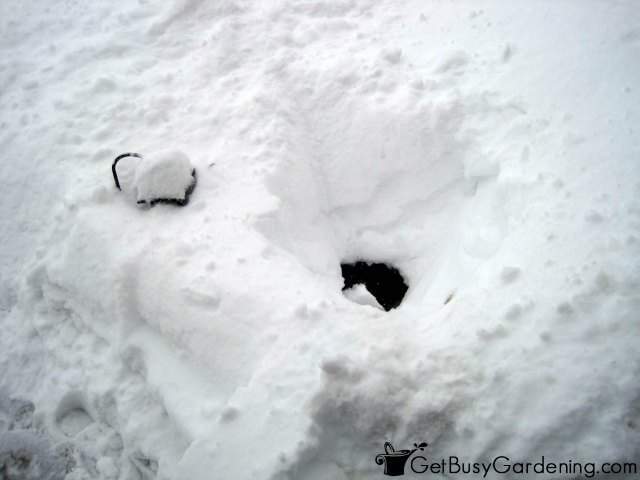
The short answer is no. As long as you take the proper steps to winterize your pond, there’s no reason to drain the water. More than likely it will fill up with rain and snow anyway.
Should I keep my pond pump running in winter?
If you live in a mild climate, then you can leave your pump running all winter long, or use an aeration kit. Running water will prevent the pond from freezing over. But if you live in a place that gets extremely cold, then you should turn it off in the fall.
When should I turn off my pond pump for winter?
If you live somewhere with very cold winters, then you should turn off your pond pump in the fall before the water starts to freeze.
Whether or not you need to remove the fish from your pond during the winter depends on the type you have. Goldfish are very hardy, and they can survive the cold as long as the water doesn’t freeze to the bottom. Koi are a bit more sensitive, but they can survive if you keep it above 40°F. However, if you have any type of tropical fish, you should bring them indoors.
More Fall Gardening Tips
- How To Protect Plants From Frost Damage
- 5 Tips to Simplify Fall Garden Cleanup
- 5 Essential Fall Garden Tasks You Should Never Skip
- How To Winterize Your Garden In The Fall
- How To Prepare Your Vegetable Garden For Winter
Share your tips or the steps you take to winterize your pond in the comments section below.
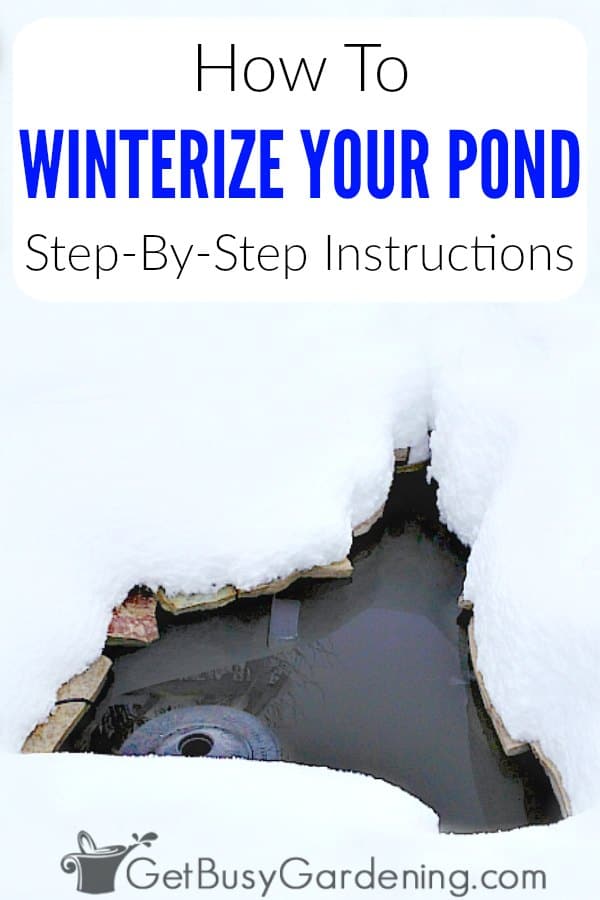

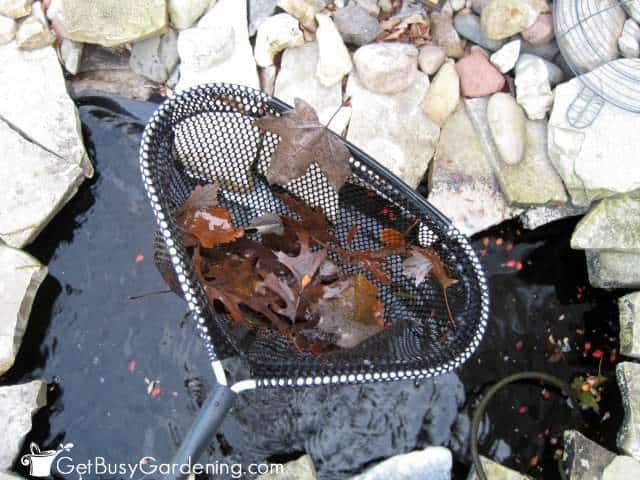
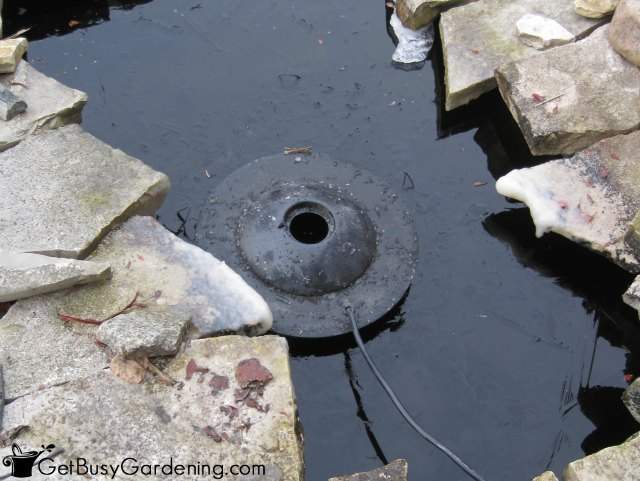

Wesley Black says
Our Winter with our pond was a nightmare it was 3′ deep 5′ by 5′ 450 gallon pond I was using inch and a quarter tubing with a 1900 gallon per hour pump. I also had a submersible air raider with a fountain kit on it which I had sticking out of the water about 12″ to 16″. I had 2 things happened that were detrimental to my pond 1st of all my bubbler blew over to a 45゚ angle and drained the pawn down to 2′ deep. The 2nd thing was my waterfall iced over and diverted water out of the pond. The 3rd thing was once it drained the pump was still running but eventually cut itself off So thankfully it did not kill the pump. But what it DID do was freeze the water in the waterfall tube which i didnt get thawed til sping! This all happened overnight so I woke up to this one time at 3 o’clock in the morning the next time at 6 o’clock in the morning so it happened twice in my Winter. Miraculously all my fish survived exept for 6. I had 13. Algae was overrun all winter! Did a cleaning and found 30 lbs of sludge and debris one dead goldfish. Two koi with bacterial infection I rescued they are still alive and slowly recovering. I have learned a lot in just one article thank you, I will do much better this upcoming winter thnx to you guys and hope my experience helps another pond beginner gain some knowledge of dos and don’t. OH, by the way I had 2 pond deicers one floater and one on bottom both were frozen and end up dying. Both bought at Amazon. This year I’m buying a pond heater.
Amy Andrychowicz says
Oh man, I’m so sorry to hear you had such a terrible experience with your pond this winter! Yes, I too learned the hard way that leaving the pump running can quickly drain your pond once ice forms over the top. Frustrating for sure, but I’m so glad you learned what to do better next year. Good luck!
Jim says
Hi Amy, I’m curious about the depth that your outdoor ponds freeze. We have a 700 gallon, 42” deep raised pond with a 4 step down waterfall feature. Last year we brought our fish in and tested the pond to see how deep the water would freeze. Here in Toronto,ON, we found that it froze 18” on top. Would a pond heater keep it open or will we need a bubbler as well. We want to leave the Koi and Goldfish in this winter.
Amy Andrychowicz says
I have never checked to see how deep the ice freezes in my ponds. But I’m pretty sure it would go all the way to the bottom, or close to it (they are about 2′ deep) during the coldest winter months if I didn’t put the heater in there. The pond heater works to keep the water open in mine all winter, expect once it gets down to about -15F or so. We usually only have a few weeks of temps that cold, and the ponds freeze over despite the heater. But, since it’s for such a short time, my fish can still survive so I don’t worry about it. I’ve never tried using a bubbler, so I can’t speak from experience there. I should specify that I have goldfish, and they are extremely cold hardy. I’m not sure if koi would survive in the pond through our extreme cold winter here in MN. They are not as hardy as goldfish.
NICOLE says
We dont remove the pump in the winter, we live zone 7, very cold winters, but we live the fountain and the skimmer on , all year round and add the pond heater right in the middle of the pond, in the winter. We feed the fish 1-2 times a week in the winter, since they dont really hibernate, we also add kosher salt after we clean the filter. Our fish are very colorful and happy.
Amy Andrychowicz says
Awesome, thanks for sharing your tips for how you overwinter your pond and your fish.
esther zimmerman says
I am a new shubunkin goldfish container pond owner. I live in New York and I was very happy to read your article about winterizing a pond, especially since you live in MN and it is much colder there than NY. In your pictures, your pond looks very small. I am curious to know how deep it is as your fish were able to survive the cold MN winters. I have a 100 gallon above-ground stock tank container pond that has a water depth of 18 inches although the of container is 2 feet deep. I want to make sure that my fish will survive in my pond if I use a deicer.
Amy Andrychowicz says
I have two small ponds, both are about 2′ deep (though I’ve never actually measured). However, mine are sunk into the ground, so the bottom of the ponds sit below the frost line. That is why I am able to leave the fish in there all winter with a stock tank heater. The ground and snow cover insulates them, and the heater keeps a hole in the top of the water open, so they won’t freeze to the bottom. If they were above-ground, the heaters would not keep them from freezing to the bottom here in MN. But it does get bitter cold here in the winter, it’s not uncommon for it to get down to -20F (with a -30F windchill) for a few weeks in January/Feb on a bad year. When it gets that cold, even the heaters can’t keep the water from freezing over the top (though they have never frozen to the bottom).
Marlys Blomquist says
Great tips, thank you! My daughter wants to do her part in helping save Illinois aquatic turtles and build a pond that is safe all year round. Do you know if there are any different steps we should take with turtles instead of, or in addition to, fish?
Amy Andrychowicz says
Oh how cute! Sorry, but I don’t have any experience raising turtles. Good luck with it though!
Jane Nelson says
Thanks for all your helpful tips.
Amy Andrychowicz says
You’re welcome!
Sally says
Thank you Amy this is a great article. I live in Denver Colorado and have two fantail goldfish. My pond is 18in deep. Can I keep them in the pond over winter with a d icer?
Amy Andrychowicz says
Yes, as long as the water doesn’t freeze to the bottom, and there’s an air hole (which the deicer will create), your goldfish should survive the winter in your pond just fine.
Cheryl says
I’m just putting my pond in and am starting with goldfish. Do you feed the during the winter
Amy Andrychowicz says
No. The goldfish will hibernate over the winter and don’t need to be fed. However, if you’re just putting your pond in now, then I would wait until spring to add the goldfish. No reason to try overwintering fish in a brand new pond.
MARY says
I also have two rubbermade ponds on the south side of my house that I lay a pane of glass partially over them and they stay partly thawed all winter unless it’s way below 0 deg.
Amy Andrychowicz says
Cool. Thanks for sharing your method of keeping your ponds from freezing over!
mary says
I have a small 50 gallon sheep tank that I sunk into the ground this summer. I’ve always had to take my fish in in the winter (3 shuebunkin) but am considering leaving them out this winter. It’s not very deep, maybe a foot, but with it being in the ground I’m hoping will help keep the water from freezing all the way through?
Amy Andrychowicz says
Depending on where you live, you may need to add a stock tank heater in order to keep the fish alive. If you live in a climate that’s cold enough where the top of the water will freeze over for more than a couple of weeks at a time, then you’ll definitely need to get a stock tank heater to keep the water open so that air can circulate and the fish won’t die. Here in MN, a one foot deep tank like that would definitely freeze to the bottom without a heater, even if it’s sunk into the ground.
Marisa says
These are great tips for winterizing my pond.. definitely sharing this!
Amy Andrychowicz says
Great! Thanks so much. 🙂
liz says
I do all of the same steps as you, except Icover my pond with a net and place an air stone bubbler in my pond instead of the heater. Twice I lost all of my koi due to the heaters, so switched over to the bubblers and all has been fine for the last 15 years. When I lived in Colorado, we could keep the falls on all year which was so nice – but here in CT, it all gets closed up.
Amy Andrychowicz says
Interesting… how did your koi die from the pond heater?